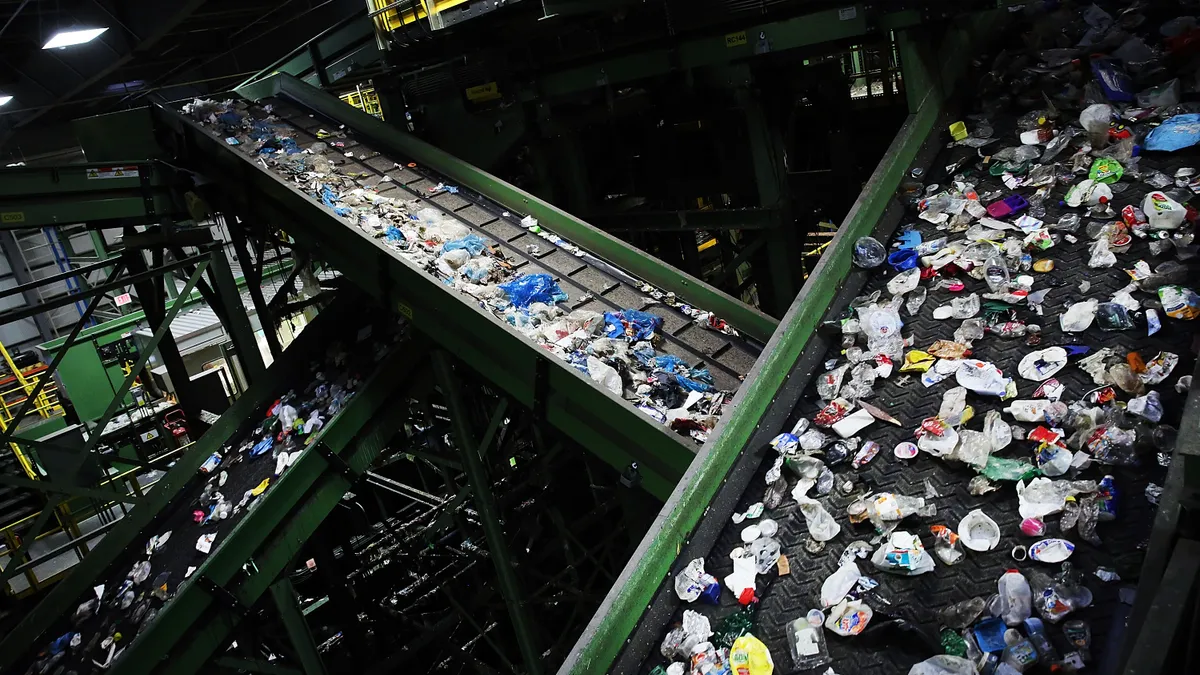Dive Brief:
- A new report from the Recycling Leadership Council (RLC) calls on the federal government to take a leading role in initiatives and legislation that could help create a "national strategy" for system issues.
- Priorities include collecting better recycling-related data, standardizing and coordinating different types of recycling systems across the country, investing in recycling infrastructure and supporting market development for recyclables.
- The RLC, led by the Consumer Brands Association (CBA) and 22 members from packaging companies, brand-backed nonprofits and others, sees the report as a blueprint for lawmakers to follow. Their report has received support from several lawmakers involved with key recycling legislation, including Senate Recycling Caucus leaders Tom Carper, D-Del., and John Boozman, R-Ark; Sens. Sheldon Whitehouse, D-R.I. and Dan Sullivan, R-Alaska; and Rep. Anthony Gonzalez, R-Ohio.
Dive Insight:
Stakeholders from across the recycling industry have spent years discussing how best to address recycling woes such as contamination, lack of markets and public confusion about recycling rules. Authors of the RLC report said big improvements will require involvement from collaborators throughout the supply chain, but the federal government has the responsibility and the resources to make the biggest changes.
“Attempting to address these issues only city by city or county by county isn't going to get us the fundamental change to how we use or waste resources. We need a national perspective, and that means federal action,” said Meghan Stasz, CBA's vice president of packaging and sustainability.
RLC has the support of a number of lawmakers involved in drafting and passing recycling-related legislation, including Whitehouse and Sullivan, whose Save Our Seas 2.0 law was signed into law in December. It provides funding for pollution clean-up efforts and waste and recycling infrastructure investments.
During the call announcing the report on Feb. 4, Sullivan said he would look to the RLC for help implementing some of the new law’s provisions, and said he and Whitehouse would continue working with the group as the two senators draft a Save Our Seas 3.0 bill they hope to introduce soon. “We have a lot of ideas for that, a lot related to recycling, actually,” Sullivan said. During the call, Sullivan and the other legislators stressed that recycling is a bipartisan issue where lawmakers can find common ground.
The coalition calls for more standardized data collection and reporting requirements for recycling programs in order to better understand what is working and what isn’t.
A lack of quantifiable data on metrics like recycling rates prevents policymakers and industry stakeholders from making more informed decisions, said Dylan de Thomas, vice president of external affairs at The Recycling Partnership. “We still don't know exactly how many recycling programs there are [across the country] or how they are different in different states. The joke is, you can't even compare apples to apples. You’re comparing apples to pretzels.”
RLC also calls for national recycling standards it hopes will help reduce confusion residents have about what materials are recyclable. This confusion leads to residents unwittingly contaminating the recycling stream, limiting the amount of high-quality materials available to be reused for new products, the report states.
Part of the issue is that different state and local programs have different definitions of what it considers recyclable. The Environmental Research & Education Foundation found at least 18 different definitions of recyclable or recycling across different states, the report says. California is one of the latest states working on its own set of new definitions.
Harmonized, standardized definitions can also help producers create packaging they are confident will be widely recycled, said Allie Hayes, senior director of communications and public policy for the Household and Commercial Products Association. “It helps us avoid a patchwork of requirements across states,” she said.
The report calls on the federal government to harmonize its own recycling systems by 2030 while also establishing shared national recycling goals and minimum performance standards, the report states.The EPA has set a goal to achieve a 50% national recycling rate target for 2030.
The RLC report additionally pushes federal lawmakers to support states by investing in recycling infrastructure, market development and consumer education through strategies such as tax credits, grants and other programs.
“The federal government can spur investment,” especially to help states and municipalities raise their recycling rates, reduce contamination, and help residents better understand what goes in the bin, said Kate Krebs, director of industry affairs for Closed Loop Partners.
Some of the heavy lifting of creating market demand comes from the brands themselves, which need to make formal commitments to using more recycled content in their products, Krebs said. She sees the federal government’s role as supporting that by purchasing more products made with recycled or renewable materials. The RLC also urges the federal government to support funding for market innovations around hard-to-recycle material and public-private partnerships researching new recycling technologies.
Though many agree the U.S. recycling system needs work, not all agree on the best course of action for improving it. Advocates of the Break Free From Plastics movement released their own recommendations to Congress in a report on Feb. 4. It asks Congress to support initiatives that provide alternatives to single-use plastics, prioritize reusable products in government facilities and invest in waste reduction efforts instead of maintaining current recycling systems.
Greenpeace has also criticized the RLC report, saying it doesn’t go far enough to acknowledge the role single-use packaging – and the manufacturers who make it – play in pollution.
"It should come as no surprise that the association representing the world’s largest plastic polluters wants to double down on individual responsibility and recycling efforts to solve the pollution crisis," Greenpeace USA Oceans Campaign Director John Hocevar said in a statement. “It is time to abandon throwaway packaging, especially plastics, and incentivize systems of reuse. If industry will not stop using single-use plastic on its own, then government will need to step in.”















